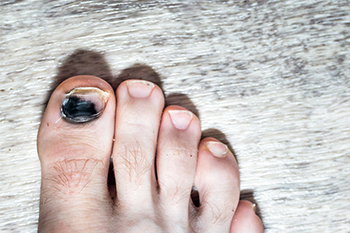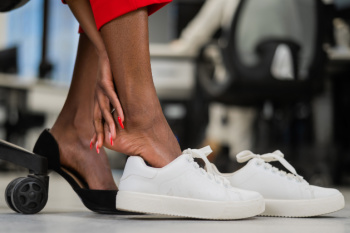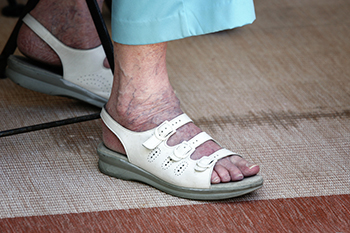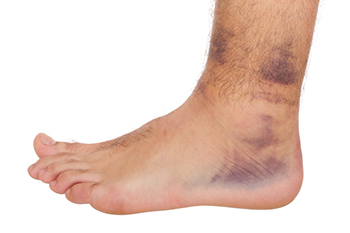Dallas (214) 340-8885
Athens (903) 677-9090
Gun Barrel City (903) 887-4341
Dallas (214) 340-8885
Athens (903) 677-9090
Gun Barrel City (903) 887-4341

Toe injuries are common among runners, often caused by the repetitive impact and friction involved in the sport. Runner’s toe, or toenail trauma, typically results from the toenail repeatedly hitting the inside of the shoe, causing pain and potential bruising. Bruised toenails occur when blood collects under the nail due to direct impact or pressure, leading to dark discoloration. Black toenails, a more severe form of bruising, may be indicative of more significant trauma and can sometimes lead to the toenail falling off. To prevent these issues, ensure that running shoes fit properly with adequate room for toe movement and cushioning to absorb shock. Regularly trimming toenails and wearing moisture-wicking socks can also reduce the risk of injury. If you are experiencing toe pain from a running injury, it is suggested that you confer with a podiatrist for treatment.
Toe pain can disrupt your daily activities. If you have any concerns, contact Dr. Jonathan Kletz of Texas Foot Works. Our doctor can provide the care you need to keep you pain-free and on your feet.
What Causes Toe Pain?
Most severe toe pain is caused due to a sports injury, trauma from dropping something heavy on the toe, or bumping into something rigid. Other problems can develop over time for various reasons.
Toe pain can be caused by one or more ailments. The most common include:
When to See a Podiatrist
Diagnosis
In many cases the cause of toe pain is obvious, but in others, a podiatrist may want to use more advanced methods to determine the problem. These can range from simple visual inspections and sensation tests to X-rays and MRI scans. Prior medical history, family medical history, and any recent physical traumatic events will all be taken into consideration for a proper diagnosis.
Treatment
Treatments for toe pain and injuries vary and may include shoe inserts, padding, taping, medicines, injections, and in some cases, surgery. If you believe that you have broken a toe, please see a podiatrist as soon as possible.
If you have any questions please feel free to contact one of our our offices located in Dallas, Athens, and Gun Barrel City, TX . We offer the newest diagnostic tools and technology to treat your foot and ankle needs.

The heel, the largest bone in the foot, plays an important role in walking and weight-bearing, absorbing shock and providing stability. Heel pain is a common issue with various causes. Plantar fasciitis, characterized by inflammation of the plantar fascia, leads to sharp, morning heel pain. Heel spurs, which are calcium deposits on the heel bone, can cause discomfort with prolonged standing or walking. Sever's disease, prevalent in growing children, results from inflammation of the heel growth plate. These conditions necessitate professional assessment. If you or a family member suffers from heel pain, it is suggested that you consult a podiatrist for a proper diagnosis, identify the underlying cause, and recommend appropriate treatments.
Many people suffer from bouts of heel pain. For more information, contact Dr. Jonathan Kletz of Texas Foot Works. Our doctor can provide the care you need to keep you pain-free and on your feet.
Causes of Heel Pain
Heel pain is often associated with plantar fasciitis. The plantar fascia is a band of tissues that extends along the bottom of the foot. A rip or tear in this ligament can cause inflammation of the tissue.
Achilles tendonitis is another cause of heel pain. Inflammation of the Achilles tendon will cause pain from fractures and muscle tearing. Lack of flexibility is also another symptom.
Heel spurs are another cause of pain. When the tissues of the plantar fascia undergo a great deal of stress, it can lead to ligament separation from the heel bone, causing heel spurs.
Why Might Heel Pain Occur?
Treatments
Heel pain should be treated as soon as possible for immediate results. Keeping your feet in a stress-free environment will help. If you suffer from Achilles tendonitis or plantar fasciitis, applying ice will reduce the swelling. Stretching before an exercise like running will help the muscles. Using all these tips will help make heel pain a condition of the past.
If you have any questions please contact one of our our offices located in Dallas, Athens, and Gun Barrel City, TX . We offer the newest diagnostic and treatment technologies for all your foot and ankle needs.

As people age, they often encounter various foot problems due to changes in foot structure and overall health. Common issues include bunions, painful bumps at the base of the big toe caused by joint misalignment, and arthritis, leading to joint pain and stiffness. Other frequent problems are plantar fasciitis, which results in heel pain from inflammation of the foot's connective tissue, and corns or calluses, which are caused by pressure and friction. These conditions can be made worse by reduced skin elasticity, poor circulation, and weakened foot muscles. Additionally, wearing improper footwear can contribute to discomfort and deformities. If you are elderly or care for an older person with a foot condition, it is suggested that you make regular appointments with a podiatrist who can monitor foot health.
Proper foot care is something many older adults forget to consider. If you have any concerns about your feet and ankles, contact Dr. Jonathan Kletz from Texas Foot Works. Our doctor can provide the care you need to keep you pain-free and on your feet.
The Elderly and Their Feet
As we age we start to notice many changes in our body, but the elder population may not notice them right away. Medical conditions may prevent the elderly to take notice of their foot health right away. Poor vision is a lead contributor to not taking action for the elderly.
Common Conditions
Susceptible Infections
Diabetes and poor circulation can cause general loss of sensitivity over the years, turning a simple cut into a serious issue.
If you have any questions please feel free to contact one of our our offices located in Dallas, Athens, and Gun Barrel City, TX . We offer the newest diagnostic and treatment technologies for all your foot and ankle needs.

A sprained foot can vary in severity, with common signs including pain, swelling, and bruising surrounding the affected area. Mild sprains involve stretching or slight tearing of ligaments, causing minimal swelling and discomfort. Moderate sprains result in more significant pain, swelling, and difficulty in bearing weight. Severe sprains, characterized by complete ligament tears, often cause intense pain, extensive swelling, and instability in the foot. Relief methods for sprained feet typically involve resting the foot, compression with a bandage to support the injured area, and elevating the foot above heart level to minimize swelling. Pain relievers can help to manage pain and inflammation. Severe sprains may require medical evaluation and possibly immobilization with a brace or cast, in addition to performing specific stretches to regain strength and range of motion in the foot. If you have sprained your foot, it is suggested that you contact a podiatrist who can offer you effective relief and treatment methods.
Although ankle sprains are common, they aren’t always minor injuries. If you need your ankle injury looked at, contact Dr. Jonathan Kletz from Texas Foot Works. Our doctor can provide the care you need to keep you pain-free and on your feet.
How Does an Ankle Sprain Occur?
Ankle sprains are the result of a tear in the ligaments within the ankle. These injuries may happen when you make a rapid shifting movement while your foot is planted. A less common way to sprain your ankle is when your ankle rolls inward while your foot turns outward.
What Are the Symptoms?
Preventing a Sprain
Treatment of a Sprain
In many cases, the RICE method (Rest, Ice, Compression, and Elevate) is used to treat ankle sprains. However, you should see a podiatrist to see which treatment option would work best with your injury. In severe cases, surgery may be required.
It is important to ask your doctor about rehab options after you receive treatment for your injury. Stretching, strength training, and balance exercises may help the ankle heal while also preventing further injury.
If you have any questions, please feel free to contact one of our our offices located in Dallas, Athens, and Gun Barrel City, TX . We offer the newest diagnostic and treatment technologies for all your foot care needs.